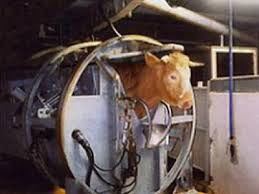Legal aspects of ritual slaughter in Poland
The legal aspects of ritual slaughter include the regulation of slaughterhouses, butchers, and religious personnel involved with traditional shechita (Jewish) and dhabiha (Islamic). Regulations also may extend to butchery products sold in accordance with kashrut and halal religious law. Governments regulate ritual slaughter, primarily through legislation and administrative law. In addition, compliance with oversight of ritual slaughter is monitored by governmental agencies and, on occasion, contested in litigation.
According to Jewish law and to Muslim law, “slaughter is carried out with a single cut to the throat, rather than the more widespread method of stunning with a bolt into the head before slaughter.” However, many Muslim authorities accept reversible stunning, such as electrostunning, prior to the cut.
Historic bans on religious slaughter
In the 1880s, anti-Semites joined forces with Animal Protection Societies to campaign for anti-shechita legislation to be passed in Switzerland, Germany and Scandinavia.
In Switzerland shechitah was forbidden throughout the whole country in 1893 after having been banned in the cantons of Aargau and St. Gallen in 1867 after plebiscites, and later a ban was introduced in the whole of Switzerland after a plebiscite at Federal level. The system of voting on individual policies using referendums (plebiscites) had only recently been introduced, and the first plebiscite in Swiss history was on the subject of banning shechita. The government and all the political parties were against the ban, but the popular sentiment won the day.
Norway banned religious slaughter without pre stunning in 1930.
Kosher slaughter was banned in Poland in 1936.
Sweden banned shechita in 1937.
Germany banned shechita nation-wide three months after Adolf Hitler came to power in 1933. There had been a prior ban in the German state of Saxony, and the League of Nations had supported the Jewish Community of Upper Silesia against Hitler in rejecting the attempts by German officials to confiscate shehitah knives and ban Jewish slaughter there as had been done in the German Reich. Bans were introduced in all the countries which the Nazis occupied, as well as in the countries of the Axis allies: Italy and Hungary. Bans introduced by the German Third Reich and by Benito Mussolini were removed by Allied Command when the Allies liberated Europe.
Subsequently, the European Convention for the Protection of Human Rights and Fundamental Freedoms included sections on Religious Freedom that in the preliminary discussions, referred specifically to religious ritual slaughter bans.
Countries in which animals must be stunned right after the cut include Latvia, Estonia, Finland, the Lower Austria province.
Countries that impose stunning before slaughter comprise Norway, Iceland, Switzerland, Liechtenstein, Denmark, and Sweden.
Complete information up to 1946 on every ban introduced in every country in Europe in the original languages and in English translation is to be found in Religious Freedom: The Right to Practice Shehitah (Munk, Munk and Berman) together with references to the original debates and an analysis that claims that until the rise of Hitler in 1933, the international campaign to introduce ritual slaughter/ shehitah bans had failed because the vast majority of countries where legislation had been proposed rejected the legislation realising the involvement of anti-Semites in the campaign and enacted legislation to stave off bans on Jewish and Muslim slaughter.
The European Union directive, “European Convention for the Protection of Animals for Slaughter”, generally requires stunning before slaughter, but allows member states to allow exemptions for religious slaughter: “Each Contracting Party may authorize derogations from the provisions concerning prior stunning in the following cases: – slaughtering in accordance with religious rituals….”
Article 9 of the European Convention on Human Rights provides for a right to freedom of thought, conscience, and religion which includes the freedom to manifest a religion or belief in, inter alia, practice and observance, subject only to such restrictions as are “in accordance with law” and “necessary in a democratic society.”
Poland banned slaughter of non-stunned animals in January, 2013, thus losing to neighbouring countries, such as Lithuania, an annual half-a-billion euro export trade to Israel, Turkey, Egypt, Iran and other Muslim-majority nations. The claim was made by animal rights activists that kosher slaughter represented cruelty to animals. The legal developments were complex, involving a government amendment to a law requiring all animals to be stunned prior to slaughter. The amendment allowed an exception to protect the religious freedoms of Poland’s tiny Jewish and Muslim communities.
After pressure from animal rights groups, the Constitutional Court quashed the amendment on the grounds that it is not permissible to amend a law so that the original intention of the law is contradicted. In December 2014, the Polish Constitutional Court overturned the ban on kosher and halal slaughter since the protection of animals “does not take priority over constitutional guarantees of religious freedom,” with Judge Maria Gintowt-Jankowicz stating in her final verdict that “the constitution guarantees the freedom of religion which includes the carrying out of all activities, practices, rites and rituals which have a religious character.”





